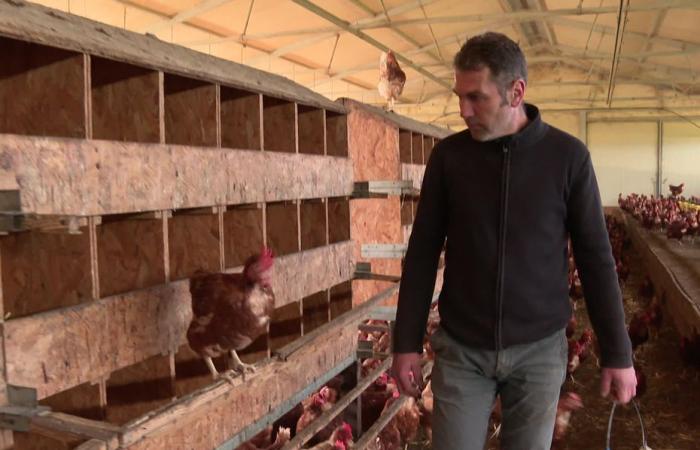By a decree published Friday, November 8 in the Official Journal, the level of risk linked to avian flu in France went from “moderate” to “high”, forcing all breeders to shelter their poultry to avoid the risk of spread of the disease. Some agricultural unions are contesting “the obligation to confine all poultry”.
The essentials of the day: our exclusive selection
Every day, our editorial team reserves the best regional news for you. A selection just for you, to stay in touch with your regions.
France Télévisions uses your email address to send you the newsletter “Today’s essentials: our exclusive selection”. You can unsubscribe at any time via the link at the bottom of this newsletter. Our privacy policy
In Saint-Georges-du-Bois, in Charente-Maritime, on Yann Auduberteau’s poultry farm, not a single laying hen roams in the open air. His five-hectare plot usually allows his 3,600 poultry to roam in the fresh air. But since this Saturday, November 9 and the decree published the day before in the Official Journal recording the increase in the level of risk for avian flu from “moderate” to “high”, the highest level, the confinement of poultry is compulsory. His land is deserted.
“You can leave them outside, but it’s at your own riskexplains Yann Auduberteau, poultry breeder. If you have a bird flu problem, obviously you will not be reimbursed, there is no insurance that will work… So if you want to be insured, and it is better to leave them locked up.“
Its chickens are therefore confined in a building of almost 500 square meters in which they could remain cloistered until April.
“Well, it’s less good for them, they have animal welfare which is not necessarily satisfactory, but hey, afterward, we have to respect the laws, that’s normal!”
duration of video: 00h01mn47s
By a decree published Friday, November 8 in the Official Journal, the level of risk linked to avian flu in France went from “moderate” to “high”, forcing all breeders to shelter their poultry to avoid the risk of spread of the disease. In Saint-Georges-du-Bois, in Charente-Maritime, on Yann Auduberteau’s poultry farm, not a single laying hen roams in the open air.
•
©France televisions
He raises the hens for their eggs and confinement has no impact on laying and its quality.
“Chickens lay eggs regularly with artificial light. Whether they go out or not, it’s pretty much the same.”
In 22 years of activity, Yann Auduberteau’s chickens have never had to deal with avian flu.
At this stage, only one case has been detected in New Aquitaine: on a duck farm in Saint-Étienne-d’Orthe, in Landes.
However, the health authorities have taken the decision to raise the risk level to its maximum “considering the strong and persistent dynamics of infection in migration corridors and the spread of the virus by these migratory birds passing through mainland French territory”.
In a joint press release, the minority agricultural unions Confédération paysanne and Modef denounce “the obligation to confine all poultry”according to them “incomprehensible”.
“The same rules have applied every winter for several years, without having proven their effectiveness. How can we still be locked into this denial of reality?” add the organizations.
In Europe, the avian influenza virus has been detected in 24 countries and the number of outbreaks is increasing, especially in Hungary, according to the latest weekly bulletin from the French animal health epidemiological surveillance platform.
The avian flu epidemic, which rages from the Americas to Australia, affected France from 2015 to 2017 and then almost continuously since the end of 2020. The country has euthanized tens of millions of poultry in recent years. The economic losses amount to billions of euros.
To break this spiral, the government has made vaccination compulsory since the fall of 2023 in farms of more than 250 ducks (excluding breeding ducks) at the end of 2023. Professionals expect the State to maintain its participation — for the time being. majority — to financing vaccination.






